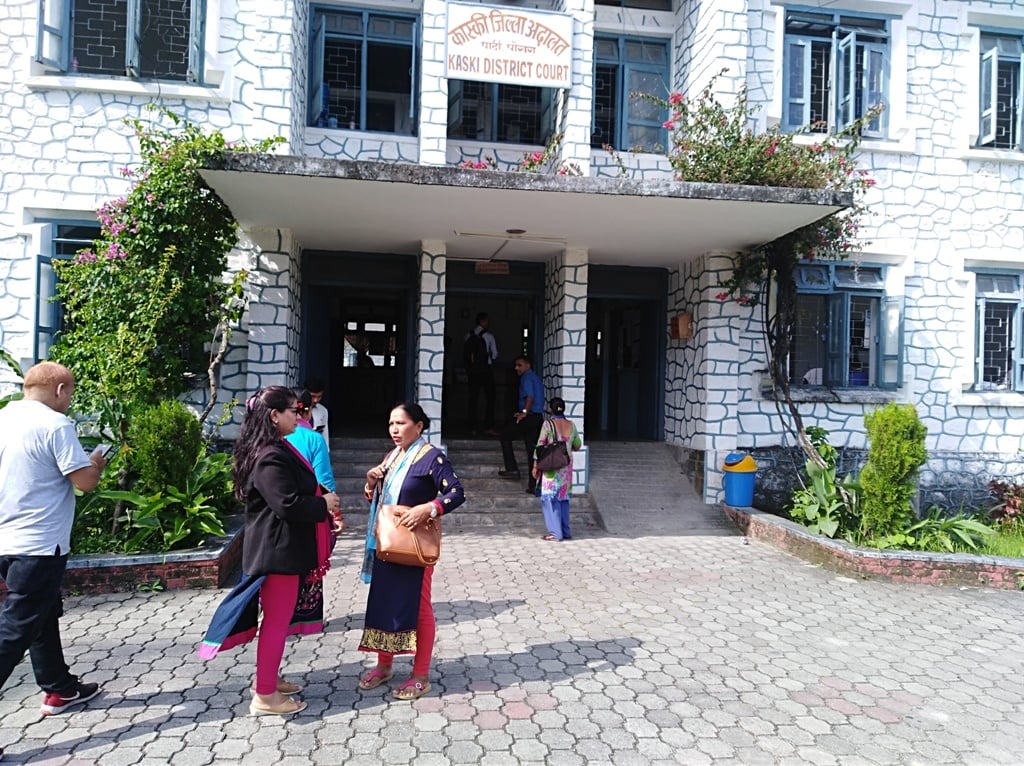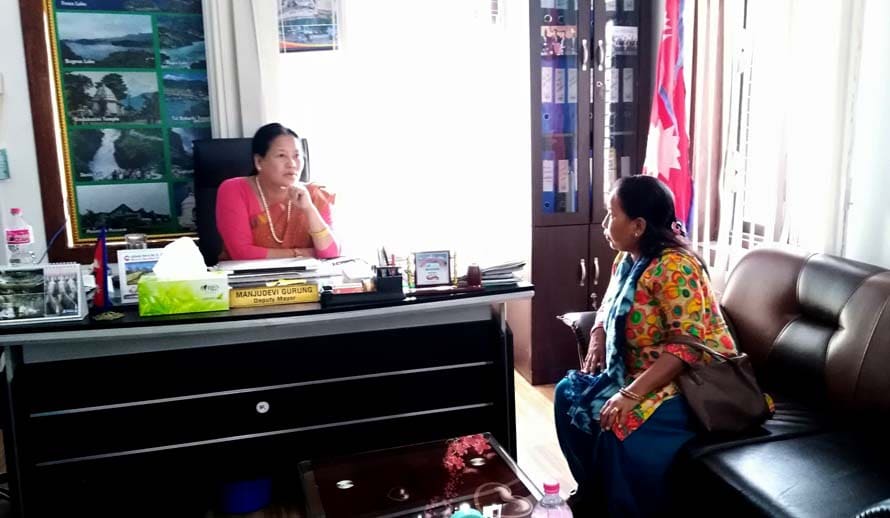The local representatives have begun to send disputes that they can resolve at ward level to the Judicial Committee of the Metropolitan City. Pointing out various causes, the Judicial Committees in turn send the cases to police and the court. Does this signal that the local bodies have become ineffective in delivering justice as per the constitution?
-Smita Adhikari : Centre for Investigative Journalism-Nepal
Pujana Basnet (name changed), a 30-year-old from Pokhara Metropolitan City-12, has been married for 10 years. But she hasn’t been able to register her marriage. Since her marriage hasn’t been registered, her son has been prevented from receiving a birth certificate. After her family members obstructed her attempts to register her marriage, she visited the ward office. But she was denied justice by the ward office.

Anjana Pariyar, a resident of Pokhara Metropolitan City, Ward No: 16, with lawyer Bhuwan Parajuli in District Court of Kaski. After her husband refused to register their marriage, her 18-year-old son faces difficulty in obtaining his citizenship.
The ward office instructed her to contact Judicial Committee to resolve the dispute. After a month of waiting from her local representatives to resolve the dispute, she finally visited the Judicial Committee. But the Judicial Committee also didn’t cooperate with her. She was told to visit the ward community police. After waiting for 15 days for the committee to resolve the dispute, she finally visited the ward police office. The police also didn’t help her get justice. Instead, she was told to visit the court. She has finally arrived at the district court of Kaski.
“When I tried to register my marriage and get my son’s birth certificate, my family members said they would recommend only if I don’t claim my share of my husband’s property,” Pujana said. “My effort to get justice was in vain after all these months.” She has registered a case seeking her share of her husband’s property in Kaski District Court. “After all I had to knock the court’s doors. Why didn’t the ward office just tell me to do that? It just wasted my time,” she said.
Binita Gurung, a 20-year-old from Pokhara Metropolitan City-31, has gone through similar experience. Two years after getting married, she tried to register her marriage. But she couldn’t register it after her husband and in-laws refused to grant approval. She also visited the judicial committee of the ward and the Metropolitan City to resolve the domestic dispute.
But they failed to provide her justice. She had to finally register the case at the court. She visited the ward office with the photo of her marriage in order to register it. However, after the ward chairman asked her to bring along the family members and her neighbors. Then, she never visited the ward office. “My family members didn’t want me to register the marriage. So I went to court without telling anyone,” said Binita.
Pabitra Subedi of Pokhara-1 urged her representatives to provide justice for her for domestic violence. No one cared about her plight. The judicial committee also failed to address her problem. “They promised me that they would cooperate. But even when my family members were present, they didn’t utter a word in my favor,” she said. After making rounds of the police and local representatives, she finally knocked the court’s doors.
These are several examples of local representatives and judicial committees failing to deliver justice to women who face injustice. Instead of solving the problem of women, local representatives have turned a deaf ear. In the federal structure, the ward office has the right to settle some disputes within its area.
Under the Local Government Operations Act of 2017, local bodies are allowed to register birth, marriage and divorce. If the local representatives themselves witnessed a birth or marriage or know of it, they can legally register the event. Despite such provision in the law, women are deprived of getting justice from their representatives. Shobha Poudel Parajuli, an advocate at the Appellate Court in Kaski and coordinator of Legal Aid Consultancy Centre, said, “The cases related to dispute regarding wedding registration and birth registration are being filed at court. Their numbers would have fallen if the work was done at local level.”
The cases related to women that end up at the court are mostly about property dispute, divorce and alimony. The disputes can be solved at local level. But the local officials have a tendency to refer the cases to court because of dysfunction at local level. The disputes that can be resolved at ward are referred to the Metropolitan Judicial Committee. The judicial committee in turn has referred it to the police and court for various reasons. “We are trying to resolve disputes related to marriage and birth certificate at the local level,” said Manju Gurung, deputy mayor and judicial committee coordinator of Pokhara Metropolitan City. “But due to legal complexity and lack of staff and physical structure, we are facing difficulty in our work.”

A woman receives counseling from Manju Devi Gurung, coordinator of the Judicial Committee at Pokhara Metropolitan City.
The Local Government Operations Act, 2017 has given the authority to the judicial committee to settle cases related to gender violence and facilitate reconciliation in various types of cases. If the defendant is not present within a week of reconciliation, they have a right to provide justice by even mobilizing police. However, despite several cases of gender violence, there hasn’t been any precedence of delivery of justice. Even if the complaints are made, the judicial committee stays silent for 35 days, allowing it to be taken over by the court.
Statistics show the tardiness demonstrated by the judicial committee of the Metropolitan City. Sixty percent of the cases registered in Pokhara Metropolitan City in the last few years are related to birth or marriage registration and citizenship. Out of which, only 10 percent were resolved by the judicial committee. The remaining cases were referred to the police or the court.
The ward officials also act similar to the judicial committees. They don’t want to settle disputes that arise in their area. If they resolve disputes, they fear backlash from the guilty side. As a result, the local representatives shy away from delivering justice. They don’t want to risk their personal relationship with neighbors, who know everything about them.
During the elections, the candidates promised that they would provide support to the voters in matters such as these. But after being elected, they seem to ignore that. Even if they know the perpetrators, the officials don’t want to upset anyone. Ram Bahadur Karki, ward chairman of Pokhara Metropolitan City-12, said, “It is difficult to settle disputes among your neighbors and acquaintances. It’s even more difficult if it’s our relatives.” That’s why Karki referred Pujana’s complaint to the police.
It was hoped that the local representatives would be able to resolve the problems of their own constituencies. That’s why they were given judicial rights under the Local Government Operation Act. The local representatives understand their beneficiaries better and so can deliver justice fairly. That was the rationale behind entrusting them with registration of marriage and birth and resolving disputes. But the representatives of Pokhara acted just the opposite.
In some cases, the parties in dispute are often relatives of the local representatives. In such a situation, local representatives do not want to antagonize them by making decisions. Local representatives can solve some disputes by acting as an informer. But they do not want to fulfill the responsibility in matters of dispute.
Gurung, the deputy mayor of Pokhara Metropolitan City, doesn’t think it is due to the irresponsibility of local representatives. She said, “If the ward officials had followed laws such as Birth, Death and Other Personal Events (Registration) Act, laws related to gender based violence and circulars issued by Ministry for Local Development, many cases would have been resolved at ward level. But the local officials refrained from carrying out identification on the cases. That’s why these disputes are reaching to the judicial committee, police and court.”
She said Pokhara Metropolitan City has employed 88 reconciliation officers to settle disputes and disorders in the area. Their main responsibility is to resolve disputes not only in judicial committees but also in the wards. But the recent developments show lack of coordination between local representatives and the officers.



